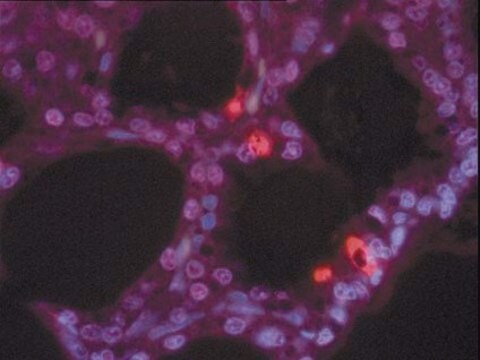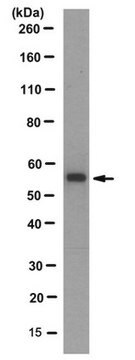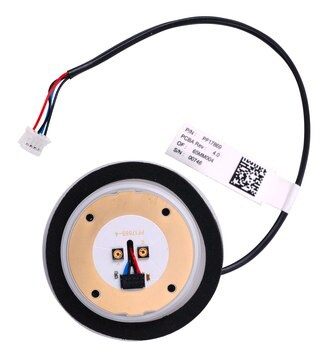About This Item
Código UNSPSC:
12352202
NACRES:
NA.71
Produtos recomendados
Formulário
liquid
Nível de qualidade
não contém
preservative
fabricante/nome comercial
Calbiochem®
condição de armazenamento
OK to freeze
avoid repeated freeze/thaw cycles
Condições de expedição
wet ice
temperatura de armazenamento
−20°C
Descrição geral
Native TdT from calf thymus. Tdt is a DNA polymerase that catalyzes the addition of deoxynucleotides to the 3′ hydroxy terminus of either double of single stranded DNA in a template-independent manner.
The Calbiochem® Terminal deoxynucleotidyl Transferase (TdT) is a DNA polymerase isolated from calf thymus. TdT catalyzes the addition of deoxynucleotides to the 3′-hydroxyl termini of either double or single stranded DNA molecules in a template independent manner. Although TdT preferentially adds deoxynucleotides to 3′-extensions, tailing onto 5′ overhangs or blunt ended double strands of DNA can also be achieved. TdT can be used for labeling DNA fragments and vectors with homopolymer tails and/or with modified deoxynucleotides such as biotin-dNTPs, 32P-dNTPs, cordycepin-dNTPs, or ddNTP.
Aplicação
DNA Labeling
Advertência
Toxicity: Standard Handling (A)
Definição da unidade
One unit is the amount of enzyme required to transfer 1 nmol of dAMP from dATP to the 3ʹ-OH terminus of d(A)50 in 60 min at 37°C.
forma física
775 Units in 50 mM potassium phosphate buffer, 1 mM B-mercaptoethanol, 50% glycerol, pH 7.2.
Reconstituição
Following initial thaw, aliquot and freeze (-20°C).
Outras notas
Chang, L.M.S. and F.J. Bollum. 1986. Crit. Rev. Biochem.21, 27.
Deng, G. and R. Wu. 1983. Methods Enzymol. 100, 96.
Michelson, A.M. and S.H. Orkin. 1982. J. Biol. Chem.257, 14773.
Roychoudhury, R. and R. Wu. 1980. Methods Enzymol.65, 43.
Nelson, T. and D. Brutlag. 1979. Methods Enzymol. 68, 41.
Roychoudhury, R., et al. 1976. Nucleic Acids Res.3, 101.
Bollum, F.J. 1974. In The Enzymes, 3rd edition (ed. P.D. Boyer), Vol. 10, 145. Academic Press, New York.
Deng, G. and R. Wu. 1983. Methods Enzymol. 100, 96.
Michelson, A.M. and S.H. Orkin. 1982. J. Biol. Chem.257, 14773.
Roychoudhury, R. and R. Wu. 1980. Methods Enzymol.65, 43.
Nelson, T. and D. Brutlag. 1979. Methods Enzymol. 68, 41.
Roychoudhury, R., et al. 1976. Nucleic Acids Res.3, 101.
Bollum, F.J. 1974. In The Enzymes, 3rd edition (ed. P.D. Boyer), Vol. 10, 145. Academic Press, New York.
Informações legais
CALBIOCHEM is a registered trademark of Merck KGaA, Darmstadt, Germany
Código de classe de armazenamento
10 - Combustible liquids
Classe de risco de água (WGK)
WGK 2
Certificados de análise (COA)
Busque Certificados de análise (COA) digitando o Número do Lote do produto. Os números de lote e remessa podem ser encontrados no rótulo de um produto após a palavra “Lot” ou “Batch”.
Já possui este produto?
Encontre a documentação dos produtos que você adquiriu recentemente na biblioteca de documentos.
Nossa equipe de cientistas tem experiência em todas as áreas de pesquisa, incluindo Life Sciences, ciência de materiais, síntese química, cromatografia, química analítica e muitas outras.
Entre em contato com a assistência técnica







